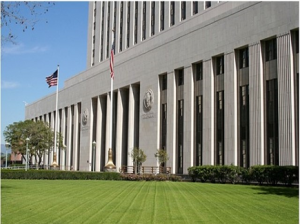LOS ANGELES
A resident of the Beverly Grove neighborhood of Los Angeles was ordered held without bond Thursday after being arrested on federal charges alleging he fraudulently got millions of dollars in Paycheck Protection Program (PPP) loans, officials stated.
Andrew Marnell used on gambling excursions to Las Vegas and transferred to his stock trading accounts.
Marnell, 40, was arrested this morning by federal authorities.
 The bank fraud count alleged in the complaint carries a sentence of up to 30 years in federal prison.
The bank fraud count alleged in the complaint carries a sentence of up to 30 years in federal prison.
A criminal complaint unsealed in court this afternoon charges Marnell with one count of bank fraud and alleges he obtained more than $8 million in PPP loans through applications to insured financial institutions, and others, on behalf of different companies.
During today’s court hearing, prosecutors said they now believe Marnell received approximately $9 million in fraudulent loans – a number that could rise as the investigation continues.
The affidavit in support of the complaint alleges that Marnell submitted fraudulent loan applications that made numerous false and misleading statements about the companies’ business operations and payroll expenses.
The affidavit also alleges that Marnell, often using aliases, submitted fake and altered documents, including bogus federal tax filings and employee payroll records.
The complaint further alleges that Marnell then transferred millions of dollars from the fraudulently obtained loan proceeds to his brokerage accounts to make risky stock market bets.
The affidavit also outlines how Marnell spent hundreds of thousands of dollars in fraudulently obtained loan proceeds at the Bellagio Hotel & Casino and other gambling establishments as recently as last weekend.
The Coronavirus Aid, Relief, and Economic Security (CARES) Act was designed to provide emergency financial assistance to millions of Americans who are suffering the economic effects resulting from the COVID-19 pandemic, officials allege.
One source of relief provided by the CARES Act is the authorization of up to $349 billion in forgivable loans to small businesses for job retention and certain other expenses through the PPP. In April, Congress authorized more than $300 billion in additional PPP funding.
The PPP allows qualifying small businesses and other organizations to receive loans with a maturity of two years and an interest rate of 1 percent. Businesses must use PPP loan proceeds for payroll costs, interest on mortgages, rent and utilities.
The PPP allows the interest and principal to be forgiven if businesses spend the proceeds on these expenses within a set time period and use at least a certain percentage of the loan towards payroll expenses.
Defendants are presumed innocent unless proven guilty.


